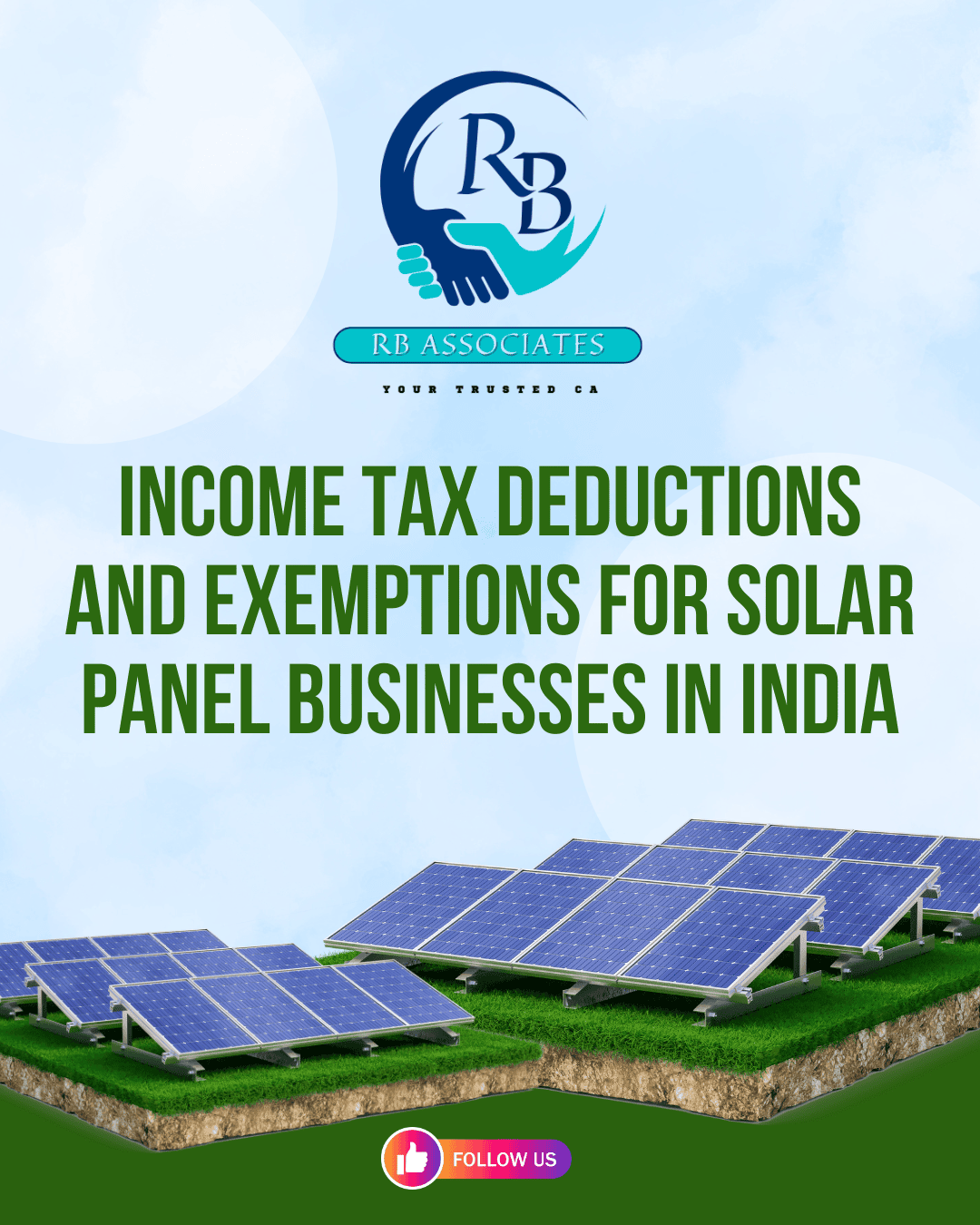As the global focus shifts toward sustainable energy, India has taken significant steps to promote renewable energy adoption. To support this green transition, the Government of India has introduced several income tax deductions and exemptions for businesses investing in solar panel installations and operations. These fiscal incentives are designed to reduce the cost burden and encourage private sector participation in the renewable energy sector.
In this blog, we explore the key income tax benefits available to solar power businesses in India, including exemptions under Section 80IA, Accelerated Depreciation under Section 32, and GST concessions.

1. Section 80IA: 100% Tax Exemption on Profits
One of the most powerful tax benefits available to solar businesses is under Section 80IA of the Income Tax Act, 1961.
✅ Key Highlights:
·100% exemption on profits derived from eligible infrastructure projects, including solar power plants.
·The exemption is available for 10 consecutive assessment years out of a block of 15 years, starting from the year of commencement of operations.
·Available for businesses involved in generation, transmission, and distribution of power from renewable sources like solar.
📝 Eligibility:
·The undertaking must be a new infrastructure facility (not formed by splitting or reconstructing an existing business).
·It should be registered in India and comply with guidelines under the Income Tax Act.
This exemption allows solar businesses to retain their profits and reinvest in operations, helping scale faster without the burden of heavy tax liabilities in the initial years.
2. Accelerated Depreciation Under Section 32
Another substantial benefit comes from Accelerated Depreciation (AD) on renewable energy assets under Section 32 of the Income Tax Act.
✅ Key Highlights:
·Businesses can claim 40% depreciation on solar plant machinery and equipment in the first year.
·An additional 20% depreciation is available if the asset is put to use for more than 180 days in the financial year.
·Helps in reducing taxable income significantly in the early years of investment.
Accelerated depreciation makes renewable energy projects financially more attractive by allowing faster cost recovery.
3. GST Exemptions and Concessional Rates
In addition to income tax benefits, the Indian government also offers GST exemptions and reduced tax rates on solar components.
✅ GST Incentives:
·Solar components like photovoltaic cells, solar inverters, and panels attract a concessional GST rate (usually 5%).
·Composite supply involving both goods and services (e.g., EPC contracts for solar projects) may also benefit from concessional GST rates under specific conditions.
These exemptions and lower tax rates bring down the initial capital expenditure for solar installations, improving the viability of such projects.
4. Other Incentives and Schemes
In addition to direct tax benefits, the government offers other financial support mechanisms, including:
·Subsidies and capital support through schemes like PM-KUSUM for rural and agricultural solar installations.
·Renewable Energy Certificates (RECs) and Green Energy Trading incentives.
·Priority lending under Renewable Energy as part of Priority Sector Lending (PSL).
Conclusion
With rising energy demand and climate commitments, investing in solar energy has never been more relevant — or more rewarding. Thanks to a host of tax exemptions, depreciation benefits, and GST concessions, the Indian government has created a favorable ecosystem for solar entrepreneurs and investors.
If you're planning to launch or expand a solar panel business in India, now is the time to leverage these incentives and maximize your financial efficiency.

